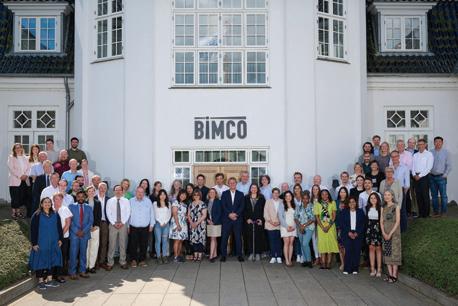





Secretary General & CEO of BIMCO answers questions about the organisation







Secretary General & CEO of BIMCO answers questions about the organisation


BIMCO facilitates trade on a global scale. Since it was established in 1905, BIMCO has grown to become a global shipping community of over 2,000 members in 130 countries. In an in-depth interview for Inside Marine, David Loosley, Secretary General & CEO of BIMCO, discussed the latest developments at the organisation.
It has been seven years since our last interview. How has BIMCO evolved and grown in this time?
Over the last seven years, BIMCO has evolved and expanded to better serve our members world-wide. We have opened offices in London to be closer to the IMO, in Brussels to be nearer to the EU decision-

making process, and in Athens and Houston to be closer to regional members.
We have also grown our membership to over 2,000 in 130 countries. We now represent 62% of the world’s tonnage, and our global membership includes shipowners, operators, managers, brokers and agents.
Internally, in 2019 we elected our first female President, Sadan Kaptanoglu, who was followed by Sabrina Chao, and currently Nikolaus H. Schües. Also, I have taken over from Angus Frew as Secretary General & CEO. BIMCO will never stop evolving, because we are here to support a truly global industry that never stands still.
What is your current work scope like? Are there any projects that are particularly noteworthy?
Our overall aim is to support our members, the IMO and the entire shipping industry in a constantly changing environment.


We, naturally, retain a strong focus on decarbonisation, which is a major and important challenge. For this, we have developed a portfolio of carbon clauses to support the industry and help our members navigate very complex regulations, including the CII and EU ETS. Also, we are working on contractual solutions for the upcoming FuelEU Maritime Regulation and we have greatly increased our focus on initiatives that can improve the operational efficiency of shipping, helping to cut our emissions immediately.
In addition, we are implementing campaigns focused on increasing support and keyworker status for our seafarers, as well as campaigns supporting the implementation of the Hong Kong Convention to ensure safe and environmentally responsible ship recycling.
BIMCO’s website offers all manner of features to support members, from market analysis to podcasts. How popular are these online assets, and how do you keep your features relevant to the interests of your members?
We have a very large amount of insight and information available at BIMCO.org, which is valuable to our members,
Secretary General & CEO of BIMCO answers questions about the organisation


including content written by our many experts. We keep our content and website up to date by closely following the agenda and the challenges and opportunities that our members face.
For example, there has been a very large interest in the CII and EU ETS regulations, which are very complex. In response to that, we have hosted webinars and written content pieces to help our members make sense of it all. Also, our website hosts over 300 contracts and clauses, as well as practical information on more than 1,800 ports world-wide,
up-to-date security warnings and war risk information. All of this can help our members make the best decisions when running their businesses.
Other services offered to members include training sessions for maritime law and shipping contracts. How have these developed since the launch of the Maritime Law Academy in 2019?
Our training offering is constantly evolving and continuously updated, just like our contracts and clauses, in fact.



During the pandemic, we converted all our face-to-face masterclasses into online courses, and they turned out to be extremely popular. As a result, we could reach a much wider audience worldwide. After the pandemic, we have reintroduced some of our face-to-face masterclasses, and we now offer both formats.
In terms of geography, we are currently increasing our training offering throughout Asia. In addition to our popular Summer Shipping School in Denmark and the Maritime Law Academy in the UK, we are launching three new weeklong academies this year: Ship Management Academy in Copenhagen in September, Maritime Chartering Academy in Shanghai in October, and Maritime Operations Academy in Dubai in November. In addi -
tion to our public courses, our customised in-house courses are also popular as we address the operational, chartering and legal issues our clients individually face.
The shipping industry is always evolving. Using feedback and experience from members and the industry, BIMCO keeps all its clauses and contracts under review. How would you summarise the benefits members gain from the work of the various BIMCO subcommittees?
The work of our documentary committee and the many subcommittees is crucial.
In a constantly changing regulatory environment, we keep the industry supplied with the contracts and clauses needed to operate, minimise conflicts and strive for compliance with IMO and EU regulations, not least when it comes to decarbonisation. The subcommittees consist of experts from different fields and nations. This is a big strength as it ensures input from different angles. We believe this diversity and wide -ranging expert knowledge is invaluable and beneficial to our members and the industry overall. In fact, we are experiencing a growing desire from our members to contribute, which we greatly welcome.
Secretary General & CEO of BIMCO answers questions about the organisation



Sustainability is a strong theme within the industry. How is BIMCO supporting the energy transition within shipping?
The energy transition might be the biggest task shipping has ever faced. We support our industry by offering the contracts and clauses needed to navigate the constantly changing regulations and by offering support and advice. We also hold webinars and offer courses to help the industry make sense of new regulations, clauses, fuel types, operational efficiency measures etc. In addition, we are very engaged with the IMO to support global regulation for a truly global industry
Given the global importance of maritime trade, how is the organisation voicing the concerns of members regarding the various events disrupting world shipping?
We have experienced a surge in geopolitical instability which affects shipping. To offer an example of how we voice our concerns we have repeatedly, together with our peer organisations, called to end the attacks on ships in the Red Sea. When we, as organisations, jointly call on more safety for our seafarers, who should never be targets or collateral damage during conflicts, we hope that our collective voice is stronger and that policy makers will help protect our ships, seafarers and ultimately world trade.
Decarbonisation is one of the biggest challenges we face as an industry. The world fleet will have to replace fossilbased fuels and that is a tremendous challenge facing numerous industries. It will in fact need the involvement of many industries and many parts of the supply chain to succeed. Some of that is beyond our control but there are initiatives that can be implemented here and now. I am referring to operational efficiency which holds tremendous potential for cutting our emissions without delay. We therefore support initiatives such as those launched by the Blue Visby Consortium which focuses on reducing the practice of ‘sail


fast then wait’. Taking such initiatives on board is crucial and so is the co-operation of the supply chain, including the ports.
What are BIMCO’s main plans and objectives for the future?
I n short, we will continue to be the practical voice of shipping.
We will continue to provide our members with advice, support and tools that work in practice, not just on paper. As an organisation, we will continue to embrace new technologies to deliver more value and an even better service to our members. A recent example of this is a new tool for our
SmartCon product, which makes contract creation smarter, cheaper and faster using cutting-edge AI technology.
Right now, shipping is facing an increasingly complicated commercial and regulatory landscape, as well as rapid technological breakthroughs and digitalisation. This area is a high priority for BIMCO and one of the reasons behind our decision to establish an in-house Standards, Innovation & Research function.
Overall, BIMCO’s plans and objectives are to be at the forefront of global developments in shipping so our members can thrive, and we can all meet our goals to reduce emissions. n
